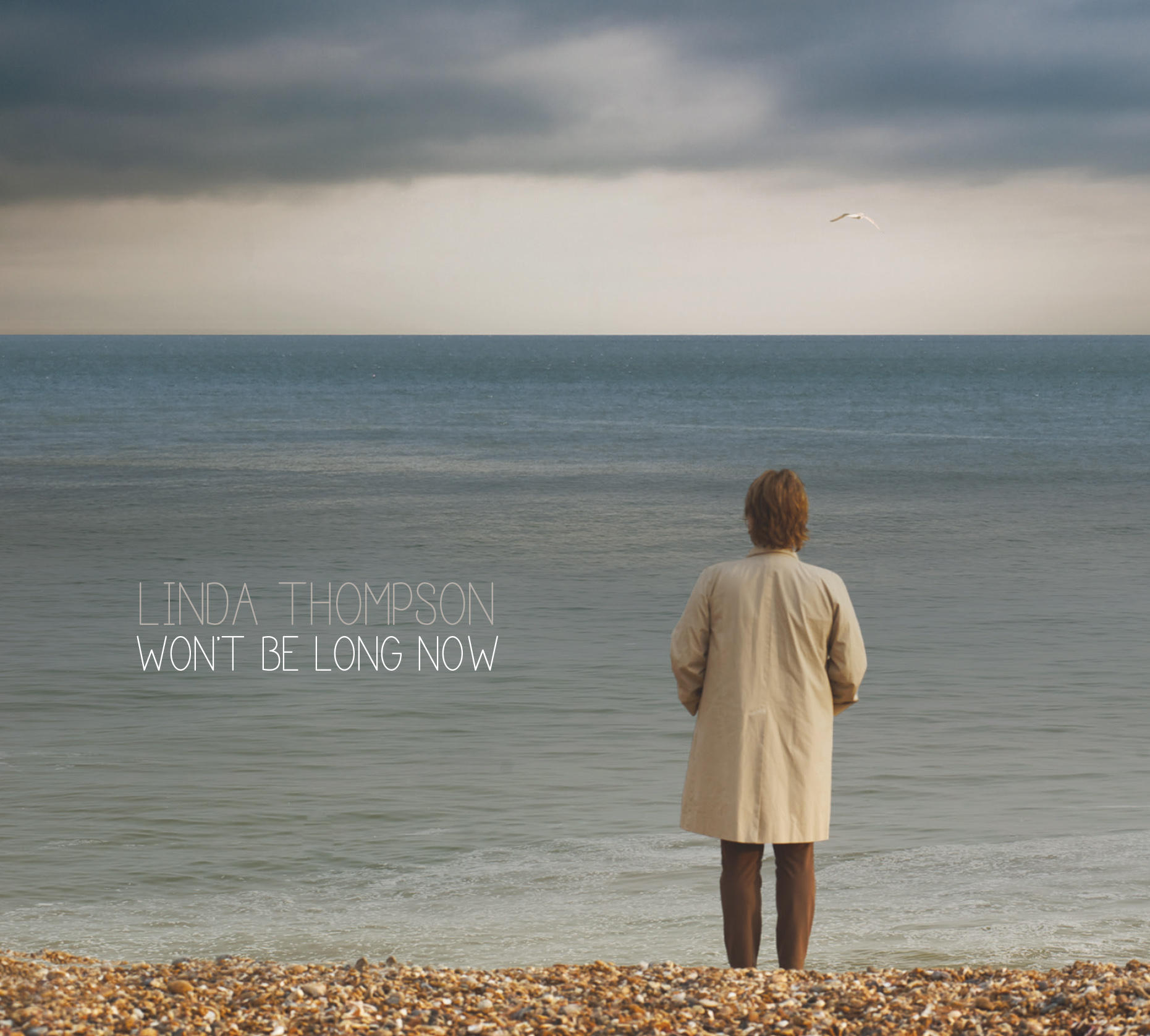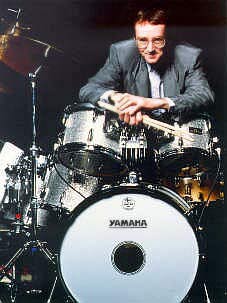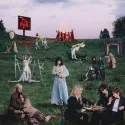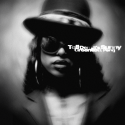Linda Thompson, one of Britain's great living singers, has just released her third solo album since her return to recording with 2001's Fashionably Late.
Talking in her London home before travelling to the US, she opens up about her latest record, It Won't Be Long Now, working with ex-husband Richard and her children Teddy, Kami and Muna, coping with the dysphonia that has afflicted her voice since 1973, and her enduring love for traditional music and the work of Martin Carthy, Dave Swarbrick and other old friends. Also today, exclusive to theartsdesk, she runs through her top 10 all-time favourite traditional songs.
 TIM CUMMING: What made you want to record again?
TIM CUMMING: What made you want to record again?
LINDA THOMPSON: When I did my last record we had a lot of material, and the more traditional stuff I kept to make a more traditional record. So I had half of it half recorded already. And it just went from there.
The first song, “Love’s for Baby’s and Fools”, is the one song written solely by you – where did that come from?
I wrote it about Rufus [Wainwright] when Kate [McGarrigle] stayed here in London before she died, and I played her a little bit of it, and she said, 'You’ve got to finish it, you’ve just got to'; and I did, and she died, and it was just nice to do it. Richard liked the song so he did it too.
It reminds me of late period Dylan, in that it could be personal, it could be epic. It’s not confessional, and the voice of the song is so sharp and uncompromising.
It is uncompromising, it’s the point of view that you can hold when you’re very young and so decisive about everything, or when you’re very old and you think, it’s all crazy. I like uncompromising. So that’s a good thought for the day. I can’t think of anything else to say about it except that it’s about Rufus Wainwright and I hope he likes it. He hasn’t even heard it, he could be on the phone to me tomorrow going “what the…!”
Did you record it with Richard [who accompanies her on solo guitar]?
We did it together in New York, then he had a gig across the street, so it was like in and out. I’d sent him a demo – with the most awful vocal on it, and I thought, Oh God, he’s never going to do this. But with typical Richard understatement, he said, ‘I’ll have a crack at it.'
Was that the first recording session you’d done together since Shoot Out the Lights?
No, not really. He’s been on stuff with me. We certainly did some live work together. And we’ve sung together, but not often. Plus this is the best one we’ve done since all those millions of years ago.
Watch Linda and Richard Thompson perform "Lonely Hearts"
It’s now 30 years since you finished.
Yes, it is a long time ago, and we’re past all that. Thirty years. It’s a long time…. One of the good things about the internet is that sometimes people put something up and I’d never play it myself, but sometimes I’ll have a listen, and sometimes it’s very nice to listen to, much better than I thought at the time. They sound so good and so live and everybody knew what they were doing. So I love the internet. It’s a retired person’s paradise.
There’s a lot of family and friends on the new album.
I like working like that. With my kids. When you’re working with them you see them more often. And as for people like Martin Carthy (pictured below) and Dave Swarbrick, I love them, I love seeing my old friends.
With Martin Carthy you go way back, don’t you?
Oh way back. We used to go out in the old days. He’s an incomparable guitarist. There’s nobody to touch him, he’s an extraordinary man. And when I listen to the traditional stuff he’s done over the years, a lot of it he wrote – it was unintelligible in the form it came from at Cecil Sharp House – but he would never take credit for that sort of stuff. He’s such a fantastic musician.
 He’s that mix of song hunting and re-creating. Have you engaged in that too?
He’s that mix of song hunting and re-creating. Have you engaged in that too?
I do; I’ve got 22,000 traditional songs in my head. People often say, “You write about the sea, about false love, murder ballads”… Well that’s just running through me, but I don’t forage anymore, I’ve done that. I’m up to my ass in traditional songs.
The song “Never Put to Sea Boys” sounds very much like an 18th century tune.
Yes I think it does. It’s a traditional story, there are traditional lines in it, and stuff from me, and the tune by guitarist John Doyle is brilliant. It sounds like you’ve heard it before, but you haven’t.
When you’re writing songs with your son Teddy [who contributes “It Won’t Be Long Now”, “Father Son Ballad”, “Mr Tams”, and “Never the Bride”] what’s your mode or working together, your dynamic?
It varies. We tend not to work in the same room. He’s youngish, and he’s impatient. I’ll give him words or a tune; sometimes I’ll give him words and he’ll say, No I’m not doing that, and vice versa. He’ll give me tunes and I can’t think of anything for it. Or he’ll write a song for me, which is the best possible option, because I don’t have to do anything.
You’ve set a Charles Causley poem to music [“Nursery Rhyme of Innocence and Experience”]. His nephew Jim Causley just released an album of songs set to his poems.
That poem just encapsulates life for me, when you love somebody that much and the years go by and he walks into the room and you think, who’s that? Or somebody gives you stuff and you say, well I don’t want that anymore. I had to twist Martin’s arm to play it. He wanted to do "Paint and Powdered Beauty". It was a while ago we recorded it, and he was saying, “You’ve got to do this”, because he pays the perfect guitar part. But I love the song, it’s a wonderful melody, and nobody seems to know who wrote it. It’s very stark and relentless. I love it.
Somehow, most poems just don’t sound right with music, with the exception of people like Leonard Cohen. I did an album of Brian Patten’s poems, years and years ago, I only sung a couple, and it wasn’t bad, but it’s difficult as a singer. You want to stop in the middle and start speaking it, but you’d have to speak in the same key, and that would be hard.
 Another stand out-track is the Belle Stewart song, “Blue Bleezin' Blind Drunk”.
Another stand out-track is the Belle Stewart song, “Blue Bleezin' Blind Drunk”.
I never met her but I saw her sing. It’s a traditional song that has two verses, and Belle (pictured right) wrote a verse and I wrote a last verse. It’s a great song. I grew up in Scotland, so Scottish traditional music is very close to my heart. It’s about battered women - unbelievable, I mean, it wasn’t even a crime. And it was nice to do it live, I don’t do much live stuff. It was in New York, the Bottom Line or Joe’s Pub. It was just a good night and I felt relaxed, and it was recorded. That was a good one. It must be a few year ago, 2008?
Tell me about Teddy’s song, "The Father Son Ballad".
I like that, though it’s weird, my son writing a song about his father, and his mother singing it. It’s very integrating somehow, brings the three of us close together. Dave Swarbrick plays fantastically on it.
He and Martin Carthy still do lots of gigs as a duo, don't they?
I know, I know. There’s so many people my age – Loudon, Elton John, Martin and Dave – that are as fantastic as ever. I don’t know how they do it, how they retain it – because it’s not easy as you get older.
Didn’t you do a covers album with Elton John?
I did some demos. I was so awful. Again, nothing’s changed with me. I was so nervous, I drank some wine, then someone said, have one of these. I said, what are they, and this girl said, they’re a new pill called Valium. Oh I’ll take one of those. It didn’t seem to work so I took another. By the end of the day Elton had to hold me up to the microphone, or I would have fallen down. I don’t recommend anyone digs that out.
Unfortunately, we have, and fortunately, it is great. Listen below.
When you look back at the music business, the way music is made and distributed is so different now. Was there a sense of the Island family, with Marley and everyone?
Absolutely. I used to play pool with Bob Marley. I’m surprised I was even able to stand up when he came in to the room, because he was a vision – he looked like God, he was such a beautiful man – and he always had this huge spliff, and he’d always give it to me. I can’t say no to Bob Marley, though I absolutely hate weed, but I’d manfully take a little puff, because how could you turn him down? And it was a real family. The music business was so different then. You just went in there, you didn’t think about money.
I’ve been reading a book of letters between Gary Snyder and Allen Ginsberg, and there’s a sense of real idealism there, and it seems so far from now, and I wondered if you feel that about the period you and your generation lived through?
 You’re completely right, but it’s never actually occurred to me because I try really hard not to – even though I think it really, that there’ll be never be anybody like the Beatles or Stones – I try really hard not to live in the 60s and 70s. I know exactly what you mean. That’s gone, that whole thing has gone, that hippy vibe. It’s all different. Things change, but it has to. That’s the way it is. But people will always hear good live music, or I hope they do. For my children’s sake.
You’re completely right, but it’s never actually occurred to me because I try really hard not to – even though I think it really, that there’ll be never be anybody like the Beatles or Stones – I try really hard not to live in the 60s and 70s. I know exactly what you mean. That’s gone, that whole thing has gone, that hippy vibe. It’s all different. Things change, but it has to. That’s the way it is. But people will always hear good live music, or I hope they do. For my children’s sake.
Is the folk tradition going to keep its place in the 21st century?
I think so, like any niche market, there’ll always be a market for unaccompanied stuff or obscure jazz. A lot of intelligent people love to be obscurist. I am, too – “Have you hear that nose flute record?” “Of course I have…” There’s a market for everything. That’s what you’ve got to do these days, find a niche – folk songs from the Hebrides – and lo and behold, that’ll be the thing to do. It’ll always exist, in one form or another.
With your first solo album, Fashionably Late, and this, It Won’t Be Long Now, you seem to have a time preoccupation.
You would too if you were sixty-fucking-six. I hate being 66. It’s all devilish. How old are you?
I’ll be 50 this year.
A baby! That’s a baby for a bloke. Yes, I have got a preoccupation with time, and with the sea. I don’t even like the sea! But I love to look at it. It’s the only thing in the world that’s tranquil and terrifying at the same time. Water sedates me, but if you go out just a little bit, you’ll just be gone. It’s so gentle and so powerful.
I hate to say it and I’ve never said it in my life before, but Richard’s a good man, but he was not good for me
Is there much more in the can for future projects?
I’ve got a whole album of music hall songs that we did live at the Lyceum, and it’s so good, and Colin Firth has done a monologue for me, and that’ll come out next year, and Teddy’s producing a family record, and we’ll all write a couple of songs, so we’re trying to make that happen. And I’m trying to make a record in New Orleans with Ann Savoy, a Cajun musician. Emmylou Harris is going to do it to, and I’ve got this idea that the three of us should do songs from our home town. I’ll do mine from Glasgow, Emmylou will do Nashville songs – I think she’s from Washington but she’s an honorary Nashvillian – and Ann will do some Cajun stuff. So if that happens that’ll be nice. We’re sorting out songs right now. Lots of projects. Again, it’s a funny thing having dysphonia, because I know so many people that would like to work as much as I could work if I wanted to, yet they can’t, and I’d like to work more, and not to be so afflicted by this thing but I’m just trying to battle through it. I just try. And in some ways it’s a blessing, because it gives my songs more – they mean more to me.
When you get together with your old friends do you talk about the past or deal with the present?
I don’t think we do. A few years ago I hired [drummer] Dave Mattacks (pictured above left) for something and I walked into the studio and burst into tears. He said: “I haven’t even played anything yet, you don’t know I’m going to be bad!” I know why I burst in to tears – because I was going out to get a sandwich and I said, “Dave, can I get you something when I go out”, and he said, “A cheese and tomato sandwich”. Well, he’s been eating cheese and tomato sandwiches for 400 years, for all the years since I’ve known him, and I absolutely – I just burst into tears.
You lived on a Sufi commune with Richard, and with the whole situation regarding Islam and the West in recent years, when you reflect on that experience, what does it say to you? Do you carry anything from those years that you find useful?
I carry the odd thing that’s useful, but mostly I carry things that aren’t useful. I think in a commune – and it was very much that kind of commune – they have to break your spirit, like Gurdjieff did, and Blavatsky, all those charlatans. They’d wake you up in the middle of the night. It’s a bit like being in the army. It wasn’t good for me. And I hate to say it and I’ve never said it in my life before, but Richard’s a good man, but he was not good for me. That whole lifestyle just wasn’t good for me. It shook me up. But I did learn some good things. I can sit in traffic jams for hours. I just don’t care about that stuff. Or stand in queues. I love queuing, it’s very therapeutic. So I learnt a certain “don’t sweat the small stuff”, but it wasn’t good. Everybody was meant to help bring up everyone else’s kids, so all the kids were neglected. And if you paid too much attention to your own kids, they’d say, “you’ve got to pay as much attention to Johnny as your own child”, and it just didn’t work for me. And I don’t think it was good for my kids at all. I really don’t.
What about Sufi music – did that come into the community?
The thing about our Cheikh, the leader of the community, was that if you were a musician, you couldn’t under any circumstances play music. If you were a baker, you couldn’t touch bread. Again, it’s to get you to become dependent. So they told Richard to stop doing music. And me, for a while. And then, Cheikh said to me, you have to sing, but he can’t do any music. And that was difficult. I used to have to sing for all these evenings, for hours and hours, and I would say to him, “Cheikh, my throat hurts”, and he’d say “nonsense, you’re not singing from your throat”. And it was really difficult, and they didn’t want Richard to sing or to play. It was just weird. Just as you were getting slightly comfortable, someone would come and tip your chair over.
 So I stay away from communities. I can’t even go to festivals. It gives me the heebie-jeebies, all those people. And my son can’t. Even though he was very young; he just can’t be round masses of people, it makes him feel ill. So it did, it affected us, and not in a good way. But the music is fantastic. I did a lot of music and a lot of singing, and when I could, I used to go to London and sing commercials. Then Cheikh heard about it and said, "you must stop doing that. What did you sing?". And I sang, “Ski, the full of fitness food” and he said, “Can you hear yourself, these inanities?" And of course he’s right; but it was terribly good money. And he said, "you must never do that again", and I didn’t. It was weird.
So I stay away from communities. I can’t even go to festivals. It gives me the heebie-jeebies, all those people. And my son can’t. Even though he was very young; he just can’t be round masses of people, it makes him feel ill. So it did, it affected us, and not in a good way. But the music is fantastic. I did a lot of music and a lot of singing, and when I could, I used to go to London and sing commercials. Then Cheikh heard about it and said, "you must stop doing that. What did you sing?". And I sang, “Ski, the full of fitness food” and he said, “Can you hear yourself, these inanities?" And of course he’s right; but it was terribly good money. And he said, "you must never do that again", and I didn’t. It was weird.
Now I think of him quite fondly, I think he lives in New Mexico and has his own money [laughter]. He’s very old. He’s got to be 80. He was an extraordinary being, but most of us were all white, over-educated kids, and perfect fodder. It was middle class kids looking for something; “Please can we have some meaning in our life?” And I did see him a few years ago. He took me to tea in Browns. And my eldest daughter came wearing loads of crucifixes, but he just said, “Oh they’re very nice, very nice”. And he was fine. He was a tough person. I like to think he had one’s best interests at heart, but a lot of us just weren’t ready for it.
Was there an idealism in going into something like that?
There was, there was. We got rid of all our money and possessions. That’s all very nice until you want a Big Mac – of which there were none in those days. So it was difficult, we survived on almost nothing. Didn’t get much sleep, and we’d get up at dawn to do our prayers... It’s not the hardest thing in the world but I wouldn’t want to do it again. I think it’s the reason I’m so namby-pamby now. “What do you mean, I’m not flying business class? I don’t think I can cope!” Because I’ve had that washing all my clothes in cold water, and getting up at three in the morning, having a baby with no nurses, no hospital, no nothing, I couldn’t do it again. I don’t like to rough it. Maybe that’s what came out of it. Perhaps I should thank Cheikh. Because I’ve found a way to manage to avoid roughing it.
You can accept this luxury into your life because of it?
Yes, indeed.
So it’s something enjoyable, but not permanent?
Yeah, yeah, yeah. I have a lot of lovely jewellery but I’m not attached to it. That’s something else I took. I love portable wealth. If someone goes, “nice watch, I’ll give you two and a half grand for it”, I’ll go “there you are, okay”, or if it’s one of the kids, and they go, “nice watch”, I’ll just give it to them. I’ve got a funny kind of itinerant leftover, bazaar merchant left in me.
We had prayer and deprivation, they’ve got crack
But stay away from communes is my advice, everybody. If you walked into a crack den, as I’ve done in New York, you’d think, this is exactly the same as the commune, the same thing. We had prayer and deprivation, they’ve got crack. But it’s the same thing, and they all look the same, with the same longing and the same desperation. The same kind of tension which was only alleviated, in our case, when Cheikh turned to us and said “well, you’ve done a wonderful thing”, or whatever. You’d be so pleased. And it’s the same with the guy who comes with the crack, and gives one person just a tiny bit more; all these things are the same. They’re all crack dens with fancy curtains.
Did you keep anything from Islam itself?
The single best thing in my humble opinion is the fact that you go down on your knees. Try it. If you’re troubled, if something’s really bothering you, the actual physical act of getting yourself onto the floor, and if you can, touching your forehead to the floor, it has a physical effect on you. It really works. Go down on your knees, put your head on the floor and stay there as long as you can, breath, and say a word – Allah, lemonade, anything. It really does help. I took that, which I think is wonderful.
"Won't Be Long Now" by Linda Thompson















Add comment